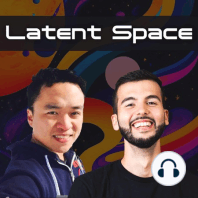80 min listen

NeurIPS 2023 Recap — Best Papers
NeurIPS 2023 Recap — Best Papers
ratings:
Length:
200 minutes
Released:
Dec 23, 2023
Format:
Podcast episode
Description
We are running an end of year listener survey! Please let us know any feedback you have, what episodes resonated with you, and guest requests for 2024! Survey link here.NeurIPS 2023 took place from Dec 10–16 in New Orleans. The Latent Space crew was onsite for as many of the talks and workshops as we could attend (and more importantly, the hosted cocktails and parties after hours)!Picking from the 3586 papers accepted to the conference (available online, full schedule here) is an impossible task, but we did our best to present an audio guide with brief commentary on each. We also recommend MLContests.com NeurIPS recap and Seb Ruder’s NeurIPS primer. We also found the VizHub guide useful for a t-SNE clustering of papers.We’ll start with the NeurIPS Best Paper Awards, and then go to a selection of non-awarded but highly influential papers, and then arbitrary personal picks to round out the selection. Where we were able to do a poster session interview, please scroll to the relevant show notes for images of their poster for discussion. We give Chris Ré the last word due to the Mamba and StripedHyena state space models drawing particular excitement but still being too early to assess impact. Timestamps* [0:01:19] Word2Vec (Jeff Dean, Greg Corrado)* [0:15:28] Emergence Mirage (Ryland Schaeffer)* [0:28:48] DPO * [0:41:36] DPO Poster Session* [0:52:03] Datablations* [0:41:36] DPO Poster Session* [1:00:50] QLoRA (Tim Dettmers)* [1:12:23] DataComp (Samir Gadre)* [1:25:38] DataComp Poster Session* [1:35:25] LLaVA (Haotian Liu)* [1:47:21] LLaVA Poster Session* [1:59:19] Tree of Thought (Shunyu Yao)* [2:11:27] Tree of Thought Poster Session* [2:20:09] Toolformer* [2:32:26] Voyager* [2:45:14] CogEval (Ida Momennajad)* [2:59:41] State Space Models (Chris Ré)Papers covered* Distributed Representations of Words and Phrases and their Compositionality (Word2Vec) Tomas Mikolov · Ilya Sutskever · Kai Chen · Greg Corrado · Jeff Dean. The recently introduced continuous Skip-gram model is an efficient method for learning high-quality distributed vector representations that capture a large number of precise syntactic and semantic word relationships. In this paper we present several improvements that make the Skip-gram model more expressive and enable it to learn higher quality vectors more rapidly. We show that by subsampling frequent words we obtain significant speedup, and also learn higher quality representations as measured by our tasks. We also introduce Negative Sampling, a simplified variant of Noise Contrastive Estimation (NCE) that learns more accurate vectors for frequent words compared to the hierarchical softmax. An inherent limitation of word representations is their indifference to word order and their inability to represent idiomatic phrases. For example, the meanings of Canada'' and "Air'' cannot be easily combined to obtain "Air Canada''. Motivated by this example, we present a simple and efficient method for finding phrases, and show that their vector representations can be accurately learned by the Skip-gram model.* Are Emergent Abilities of Large Language Models a Mirage? (Schaeffer et al.). Emergent abilities are abilities that are present in large-scale models but not in smaller models and are hard to predict. Rather than being a product of models’ scaling behavior, this paper argues that emergent abilities are mainly an artifact of the choice of metric used to evaluate them. Specifically, nonlinear and discontinuous metrics can lead to sharp and unpredictable changes in model performance. Indeed, the authors find that when accuracy is changed to a continuous metric for arithmetic tasks where emergent behavior was previously observed, performance improves smoothly instead. So while emergent abilities may still exist, they should be properly controlled and researchers should consider how the chosen metric interacts with the model.* Direct Preference Optimization: Your Language Model is Secretly a Reward Model (Rafailov et al.)* W
Released:
Dec 23, 2023
Format:
Podcast episode
Titles in the series (67)
Segment Anything Model and the Hard Problems of Computer Vision — with Joseph Nelson of Roboflow by Latent Space: The AI Engineer Podcast — Practitioners talking LLMs, CodeGen, Agents, Multimodality, AI UX, GPU Infra and all things Software 3.0